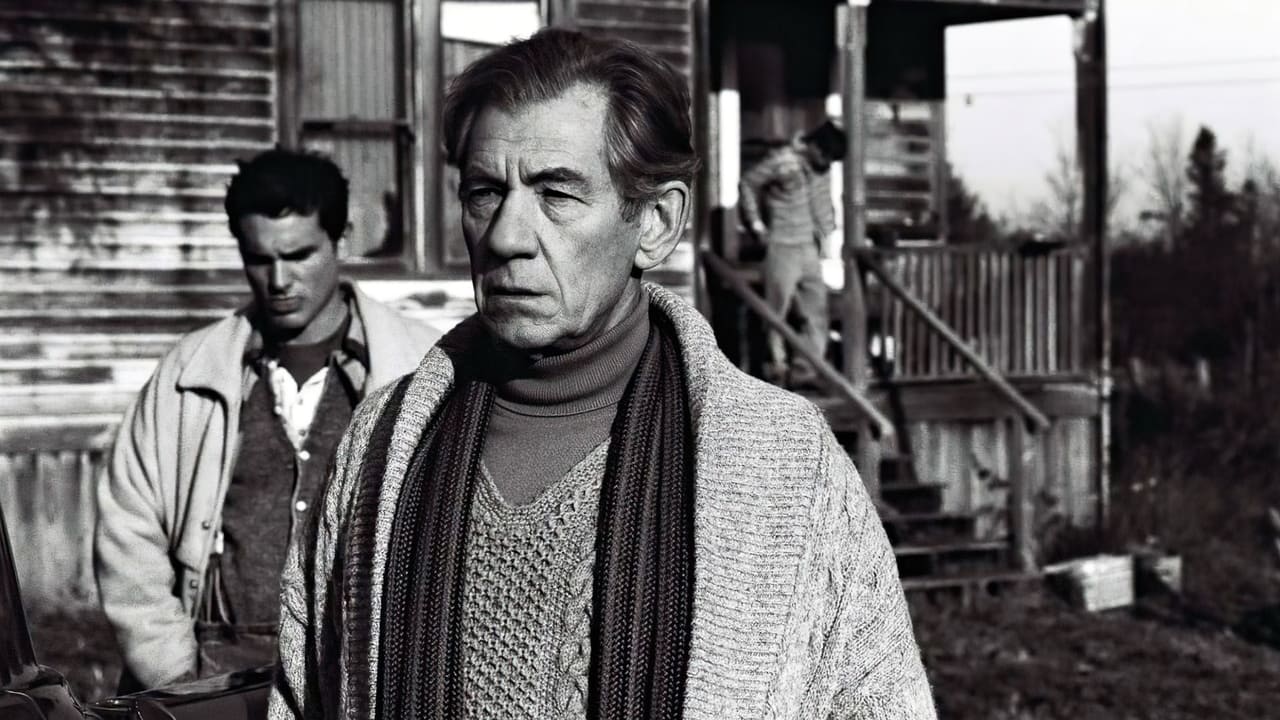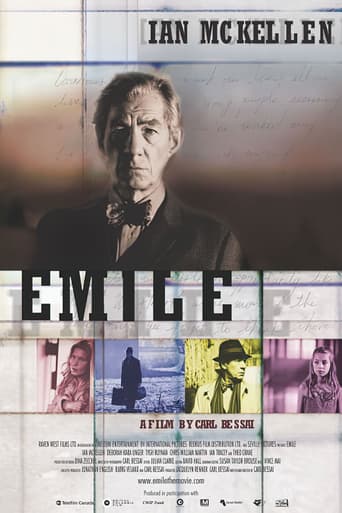Alicia
I love this movie so much
Nonureva
Really Surprised!
Jakoba
True to its essence, the characters remain on the same line and manage to entertain the viewer, each highlighting their own distinctive qualities or touches.
Catherina
If you're interested in the topic at hand, you should just watch it and judge yourself because the reviews have gone very biased by people that didn't even watch it and just hate (or love) the creator. I liked it, it was well written, narrated, and directed and it was about a topic that interests me.
rowmorg
McKellen plays a senior UK academic returning to Canada to receive an honorary degree. He stays with his niece (Unger) who is newly separated (that's her hubby off the budget) and her grumpy adolescent daughter. Relations are frosty at first until the issue gets aired, which sets our hero off on a journey down memory lane to his troubled family farm on the prairies. Everything revolves around McKellen and his character, whom we have to believe and care about. Sadly, we learn almost nothing about him apart from an initial glimpse of his college rooms and a dumpy woman "assistant" (with the muted suggestion that he is gay). We do not even learn anything about his scientific studies, the focus of his life's work, so his character would not pass the elementary requirements of a screen writing software package. How scripts with structural problems like this get green-lighted by national film-funding bodies is beyond me. There is a further problem with Unger's character, when she asks the professor: "Do you remember my mother?" and he says "not really", thus removing any possibility of dealing with the orphaned Unger's most important relationship. A further problem arises with the flashback passages in which we glimpse his brothers, but not well enough to understand their motivations or his relationship with them. Finally, the script fails to provide an adequate breakthrough to resolve his situation, and the pay-off is therefore unsatisfying. However, because the film is intelligently filmed and directed, these faults are not hidden, and the film works in spite of them, particularly for McKellen fans who love his puckish face and plummy accent.
lastliberal
In the second part of a twin bill for Ian McKellen, he stars with Deborah Kara Unger in a compelling drama about a man who goes back home after 40 years and has to deal with the past he left behind.In contrast to Cold Comfort Farm, in which McKellan played a small role, this movie is all about him. He goes back and forth from the present to his life in Canada 40 years before. He even engages in conversations with his brothers, who appear in the present. he works to resolve his crisis and, with the help of 10-year-old Theo Crane, is able to come to a comfortable conclusion.For those of us who leave home and return, there is a lot of things familiar in this very good movie.
postglock
Wonderful performances by all actors involved, Ian McKellen especially gives a typically intelligent and nuanced rendering. The plot is solid, but the main flaws lie in the tedious direction, cinematography and editing. Flashbacks are overused and signalled with horrendous transparency. The direction is terribly heavy-handed, which is unfortunate; plot-lines that are already capable of arousing viewer sympathy are then dwelled upon with even less subtlety. The ponderous soundtrack would be palatable under normal circumstances, but rapidly becomes irritating when prefaced by a "have you ever...?" question and combined with slow-motion, sepia effects. There is also a problem with the audio, where inconsistent mixing/mastering have allowed too many low-mids in the mix about half of the time, making some of the dialogue indistinct.Worth watching if you appreciate Ian McKellen's work, but expect to lose interest by the end.
Tom Murray
Emile is one of the best Canadian films that I have ever seen. Ian McKellen is superb as Emile, a loner who abandoned his family many years ago and finds himself visiting his few remaining relatives.Emile lived with his two brothers on a Saskatchewan farm. Karl, the eldest, was an insensitive controller. Emile, the educated one, left to be a professor in England, leaving Karl and the youngest, depressed brother on their own, with tragic consequences. Karl married and had a daughter, Nadia (Deborah Kara Unger). When Karl and his wife died in an accident, Emile was sent for to get his niece, Maria (Theo Crane), who was in an orphanage. Emile returned to look into business about the farm but made up an excuse why he could not take the niece back with him. These details from the past all appear in flashbacks, as seen in Emile's own mind. He remembers everyone as he last saw them: his brothers as they were when he left them but himself as he is now. Remembrances of things that he never witnessed are all portrayed as he imagined them or as he would like to imagine them.In the present, his Alma Mater, a university in Victoria B.C. is bestowing an honorary degree upon him. His niece, Nadia, invites him to stay with her and her daughter, Maria. Everything is in turmoil; Nadia has just left her husband and taken Maria with her. They have just moved into a new home and Maria is quite distraught and taciturn; everything in her life has just been changed. Now, a great uncle, whom she has never seen, appears. At first Maria is aloof but soon they become the best of friends and all relationships reconfigure.Deborah Kara Unger and Theo Crane both played their roles convincingly. McKellen's performance could very well be his best ever. His portrayal of a personality in flux is subtle and clear. He must come to terms with the suffering that his decisions have caused others and whether to stay a loner or become involved.

